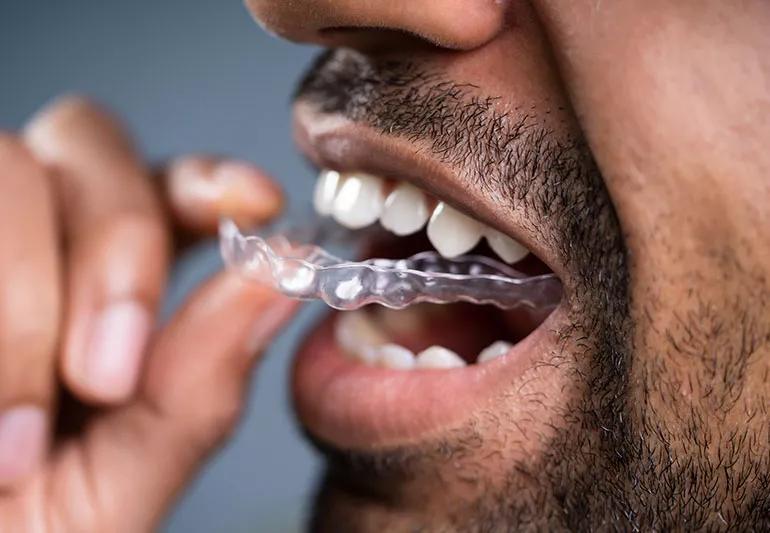Teeth grinding and sleep disorders often go hand in hand, with bruxism being both a symptom and a consequence of disrupted sleep patterns. If you’re frequently waking up with a sore jaw, headaches, or damaged teeth, your nighttime grinding could be linked to an underlying sleep disorder. Understanding the connection between Teeth Grinding Treatment and sleep disorders is the first step toward effective treatment and restful sleep.
What Is Teeth Grinding and Why Does It Happen?
Teeth grinding, or bruxism, is the involuntary clenching or gnashing of teeth, often occurring during sleep. While some cases are mild, chronic grinding can lead to serious dental and muscular issues.
- Sleep bruxism: Most grinding occurs during non-REM stages of sleep without the person realizing it
- Daytime vs nighttime: Daytime grinding is often stress-related, while nighttime grinding typically has deeper physiological roots
- Jaw tension: Frequent grinding can cause jaw stiffness, tension headaches, and worn enamel
- Nocturnal triggers: Unlike daytime grinding, sleep bruxism is usually associated with other sleep disturbances
Recognizing nighttime grinding is essential because it's usually linked to more complex sleep-related problems.
Common Sleep Disorders Linked to Bruxism:
Understanding how teeth grinding and sleep disorders are connected involves identifying the specific conditions that commonly coexist with bruxism.
- Obstructive sleep apnea (OSA): Interrupted breathing during sleep often coincides with grinding episodes
- Snoring: Chronic snorers are more likely to clench or grind their teeth due to airway obstruction
- Insomnia: Difficulty falling or staying asleep can heighten stress levels, leading to grinding
- Restless leg syndrome: This neurological disorder can be accompanied by other nighttime movements like jaw clenching
- Sleep talking and arousals: These disruptive behaviors often signal an overactive sleep cycle, which can trigger grinding
If you suspect any of these disorders, it's important to consult both a dentist and a sleep specialist for a comprehensive evaluation.
Why the Connection Exists Between Grinding and Sleep Issues?
The link between teeth grinding and sleep disorders lies in the brain’s response to disrupted sleep and muscle activity.
- Arousal response: The body’s reaction to sleep disturbances often includes involuntary jaw muscle activation
- Airway defense: In people with OSA, grinding may serve as a subconscious mechanism to reopen the airway
- Increased brain activity: Sleep disorders often cause spikes in brain activity that trigger muscle contractions, including those in the jaw
- Fragmented sleep: Lack of deep, restorative sleep leads to increased muscle tension and bruxism
- Hormonal imbalances: Sleep disruption affects cortisol levels and other hormones that contribute to muscle control
This neurological and physiological connection makes treating both issues simultaneously more effective.
Symptoms That Point to a Sleep-Related Grinding Problem:
Because bruxism often goes unnoticed at night, understanding its signs helps reveal its potential connection to sleep disorders.
- Morning headaches or facial pain: A common result of jaw muscle strain from grinding
- Worn, flattened, or chipped teeth: Damage from frequent clenching and pressure
- Interrupted sleep: Frequent nighttime awakenings may indicate underlying sleep apnea or disturbances
- Tiredness despite sleep: Poor-quality rest due to grinding can lead to fatigue and mood changes
- Jaw clicking or limited movement: Indicators of temporomandibular joint stress linked to nocturnal grinding
Keeping a sleep journal or using sleep-tracking apps can help you monitor these patterns and share insights with your healthcare provider.
Diagnosis and Treatment Options:
Effectively addressing both teeth grinding and sleep disorders involves a collaborative approach between dental and medical professionals.
- Dental exam: Dentists can detect signs of grinding and fit you with a protective nightguard
- Sleep study (polysomnography): A detailed test to identify sleep apnea or other disorders
- Custom nightguards: These reduce wear on teeth and may help lessen muscle strain
- CPAP machines: For those with sleep apnea, CPAP therapy can reduce both snoring and bruxism
- Behavioral therapy: Stress management, CBT, and habit reversal training are often recommended
- Medications: In some cases, muscle relaxants or sleep aids may be prescribed short-term
Treating both aspects together improves outcomes significantly and promotes better sleep and dental health.
Long-Term Prevention and Lifestyle Tips:
Once treatment has begun, lifestyle changes can help manage both bruxism and the associated sleep disorders effectively.
- Limit caffeine and alcohol: These substances can interfere with sleep and exacerbate grinding
- Maintain a sleep schedule: Consistent bedtime routines support better-quality sleep
- Reduce screen time before bed: Blue light can delay melatonin production and disrupt the sleep cycle
- Practice jaw relaxation: Gentle massages and jaw exercises can reduce nighttime tension
- Manage stress: Incorporate mindfulness, yoga, or breathing exercises into your daily routine
- Regular checkups: Routine visits with your dentist ensure your teeth and jaw stay protected long-term
These daily habits support a healthy sleep pattern and reduce the risk of returning bruxism symptoms.
Conclusion:
Understanding the link between Best Teeth Grinding Treatment and sleep disorders allows for a more targeted and successful approach to treatment. By recognizing the signs early, consulting the right professionals, and making smart lifestyle choices, you can protect your teeth, improve sleep quality, and enjoy better overall health.
- Don’t ignore nighttime grinding: It could be a sign of deeper health issues
- Seek dual care: Combine dental treatment with sleep disorder evaluation
- Stay proactive: Long-term relief requires consistent care and lifestyle awareness
When you treat the root cause, you unlock lasting comfort and true rest.

